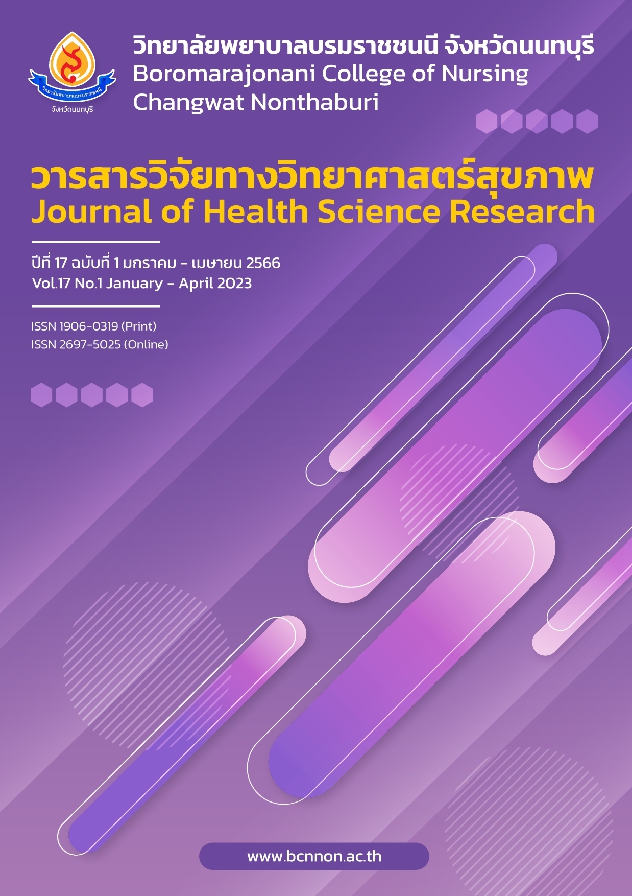บทบาทพยาบาลในการจัดการน้ำหนักตัวของหญิงตั้งครรภ์
Main Article Content
บทคัดย่อ
การจัดการน้ำหนักตัวขณะตั้งครรภ์เป็นวิธีการหนึ่งที่สำคัญ ที่ช่วยให้เกิดการเปลี่ยนแปลงของ ภาวะสุขภาพที่อาจนำมาสู่ผลลัพธ์การตั้งครรภ์และการคลอดที่พึงประสงค์ทั้งกลุ่มสตรีน้ำหนักตัวน้อย น้ำหนักตัวปกติ หรือสตรีน้ำหนักเกินและอ้วนก่อนตั้งครรภ์ จากสถานการณ์ปัญหาการเปลี่ยนแปลงของน้ำหนักตัวขณะตั้งครรภ์ที่ไม่เหมาะสม ทำให้บุคลากรด้านสุขภาพ และทุกฝ่ายที่เกี่ยวข้องต้องให้ความสำคัญ ร่วมมือกันแก้ไขปัญหาดังกล่าว บทความวิชาการฉบับนี้มีวัตถุประสงค์เพื่อนำเสนอสถานการณ์ปัญหาการเปลี่ยนแปลงของน้ำหนักตัวขณะตั้งครรภ์ และผลกระทบต่อภาวะสุขภาพมารดาทารก ปัจจัยกำหนดการเปลี่ยนแปลงของน้ำหนักตัวขณะตั้งครรภ์ น้ำหนักตัวที่ควรเพิ่มขึ้นขณะตั้งครรภ์ กลยุทธ์และองค์ความรู้ในการส่งเสริมสุขภาพเพื่อการควบคุมน้ำหนักตัวขณะตั้งครรภ์ รวมถึงการสังเคราะห์องค์ความรู้จากการปฏิบัติการพยาบาลของอาจารย์พยาบาลบนพื้นฐานการอ้างอิงหลักฐานเชิงประจักษ์งานวิจัย เพื่อนำเสนอบทบาทของอาจารย์พยาบาลในการจัดการกับการเปลี่ยนแปลงของน้ำหนักขณะตั้งครรภ์ได้อย่างมีประสิทธิภาพ
Downloads
Article Details

อนุญาตภายใต้เงื่อนไข Creative Commons Attribution-NonCommercial-NoDerivatives 4.0 International License.
บทความที่ได้รับการตีพิมพ์เป็นลิขสิทธิ์ของวิทยาลัยพยาบาลบรมราชชนนี จังหวัดนนทบุรี
ข้อความที่ปรากฏในบทความแต่ละเรื่องในวารสารวิชาการเล่มนี้เป็นความคิดเห็นส่วนตัวของผู้เขียนแต่ละท่านไม่เกี่ยวข้องกับวิทยาลัยพยาบาลบรมราชชนนี จังหวัดนนทบุรี และคณาจารย์ท่านอื่น ในวิทยาลัยฯ แต่อย่างใด ความรับผิดชอบองค์ประกอบทั้งหมดของบทความแต่ละเรื่องเป็นของผู้เขียนแต่ละท่าน หากมีความผิดพลาดใด ๆ ผู้เขียนแต่ละท่านจะรับผิดชอบบทความของตนเองแต่ผู้เดียว
เอกสารอ้างอิง
Martínez-Hortelano JA, Cavero-Redondo I, Álvarez-Bueno C, Garrido-Miguel M, Soriano-Cano A, Martínez-Vizcaíno V. Monitoring gestational weight gain and prepregnancy BMI using the 2009 IOM guidelines in the global population: a systematic review and meta-analysis. BMC Pregnancy Childbirth. 2020;20(1):649. doi: 10.1186/s12884-020-03335-7.
Arora P, Tamber Aeri B. Gestational weight gain among healthy pregnant women from Asia in comparison with Institute of Medicine (IOM) guidelines-2009: A systematic review. J Pregnancy. 2019:3849596. doi: 10.1155/2019/38 49596.
Deemongkol P, Limruangrong P, Phahuwatanakorn W, Boriboonhirunsarn D. Predictive factors of gestational weight gain among overweight and obese women. Nursing Science Journal of Thailand. 2020;38(2):46-58. (in Thai).
Ministry of Public Health. The 2nd national reproductive health development policy and strategy (2017-2026) on the promotion of quality birth and growth. Bureau of Reproductive Health. [internet]. 2016 [cited 2022 Apr 30]; Available from: https://rh.anamai.moph.go.th/th/download-03/download?id=39713&mid=31985&mkey=m_document&lang=th&did=13761. (in Thai).
Bureau of Reproductive Health, Department of Health, Ministry of Public health. A mid-term evaluation of the second national reproductive health policy and strategies (2017- 2026) to promote quality of birth and growth. [internet]. 2021 [cited 2021 Jan 30]; Available from: https://rh.anamai. moph.go.th/th/download-03/download?id=80 427&mid=31985&mkey=m_document&lang =th&did=25574. (in Thai).
Cheney K, Berkemeier S, Sim KA, Gordon A, Black K. Prevalence and predictors of early gestational weight gain associated with obesity risk in a diverse Australian antenatal population: a cross-sectional study. BMC Pregnancy Childbirth. 2017;17(1):296. doi: 10.1186/s12884-017-1482-6.
Limruangrong P. Nursing Practice for the Management of Overweight in Women. In: Sinthu S, Editor, Sindhu S, Limruangrong P, Tungkumwan T. Nurse Led in Overweight Management. 1st edition. Bangkok: Wattana Printing; 2015. (in Thai).
Guan P, Tang F, Sun G, Ren W. Effect of maternal weight gain according to the Institute of Medicine recommendations on pregnancy outcomes in a Chinese population. J Int Med Res. 2019;47(9): 4397-412. doi: 10.1177/0300060519861463.
Goldstein RF, Abell SK, Ranasinha S, Misso ML, Boyle JA, Harrison CL, et al. Gestational weight gain across continents and ethnicity: systematic review and meta-analysis of maternal and infant outcomes in more than one million women. BMC Med. 2018;16(1):153. doi: 10.1186/s12916-018-1128-1.
Arora R, Arora D, Patumanond J. Risk of high gestational weight gain on adverse pregnancy outcomes. 2013;3(1):142-7. doi: 10.4236/ojog.2013.31A027.
Sunsaneevithayakul P, Titapant V, Ruangvutilert P, Sutantawibul A, Phatihattakorn C, Wataganara T, et al. Relation between gestational weight gain and pregnancy outcomes. J Obstet Gynaecol Res. 2014;40(4):995-1001. doi: 10.1111/jog.12293.
Institute of Medicine (US) and National Research Council (US) Committee to Reexamine IOM Pregnancy Weight Guidelines. In: Rasmussen KM, Yaktine AL, editors. Weight gain during pregnancy: reexamining the guidelines. Washington (DC): National Academies Press (US); 2009.
American College of Obstetricians and Gynecologists. ACOG Committee opinion no. 549: Obesity in pregnancy. Obstet Gynecol. 2013;121(1):213-7. doi: 10.1097/ 01.aog.000 0425667.10377.60.
Kampan S, Tulyakul P, Saetan C. Factors predicting gestational weight gain among overweight pregnant women. The Southern College Network Journal of Nursing and Public Health. 2021;8(1): 222-33. (in Thai).
Dolatian M, Sharifi N, Mahmoodi Z, Fathnezhad‐kazemi A, Bahrami‐vazir E, et al. Weight gain during pregnancy and its associated factors: A path analysis. Nurs Open. 2020;7(5):1568-77. doi: 10.1002/nop2.539.
Knight-Agarwal CR, Williams LT, Davis D, Davey R, Shepherd R, et al. The perspectives of obese women receiving antenatal care: A qualitative study of women's experiences. Women Birth. 2016;29(2):189-95. doi: 10.1016/j.wombi. 2015.10.008.
Whitaker KM, Becker C, Healy H, Wilcox S, Liu J. Women's report of health care provider advice and gestational weight gain: A systematic review. J Womens Health (Larchmt). 2021;30(1):73-89. doi: 10.1089/jwh.2019.8223.
Wie JH, Park IY, Namkung J, Seo HW, Jeong MJ, Kwon JY. Is it appropriate for Korean women to adopt the 2009 Institute of Medicine recommendations for gestational weight gain? PloS one. 2017;12(7) :e0181164. doi: 10.1371/journal.pone.0181164.
Jiang X, Liu M, Song Y, Mao J, Zhou M, et al. The Institute of Medicine recommendation for gestational weight gain is probably not optimal among non-American pregnant women: a retrospective study from China. J Matern Fetal Neonatal Med. 2019;32(8): 1353-8. doi: 10.1080/14767058.2017.1405388.
Morisaki N, Nagata C, Jwa SC, Sago H, Saito S, Oken E, et al. Pre-pregnancy BMI-specific optimal gestational weight gain for women in Japan. J Epidemiol. 2017;27(10):492-8. doi: 10.1016/j.je.2016. 09.013.
Bahri Khomami M, Walker R, Kilpatrick M, de Jersey S, Skouteris H, Moran LJ. The role of midwives and obstetrical nurses in the promotion of healthy lifestyle during pregnancy. Ther Adv Reprod Health. 2021;15:26334941211031866. doi: 10.11 77/26334941211031866.
Arefi Z, Sadeghi R, Shojaeizadeh D, Yaseri M, Shahbazi Sighaldeh S. The effect of educational intervention on nutritional behavior in pregnant women based on social cognitive theory, J Matern Fetal Neonatal Med. 2022;35(25):9724-29. doi: 10.1080/14767058.2022.2050901.
Mithaug DE. Self-regulation theory: How optimal adjustment maximizes gain. Westport, CT, US: Praeger Publishers/ Greenwood Publishing Group; 1993.
Office of Health Promotion, Department of Health, MOPH, Thailand. Antenatal care guideline for healthcare providers. [internet]. 2022 [cited 2022 Mar 21]; Available from: https://hp.anamai.moph. go.th/th/manuals-official/209082. (in Thai).
Department of Health, Ministry of Public Health, Thailand. Guidelines for nutritional health promotion in clinics. Bureau of Nutrition, Department of Health. Bangkok: The War Veterans Organization of Thailand Printing; 2015. (in Thai).
Simon A, Pratt M, Hutton B, Skidmore B, Fakhraei R, Rybak N, et al. Guidelines for the management of pregnant women with obesity: A systematic review. Obes Rev. 2020;21(3):e12972. doi: 10.1111/obr.12972.
Denison FC, Aedla NR, Keag O, et al. Care of women with obesity in pregnancy: Green-top guideline No.72. BJOG. 2019; 126(3):62-106. doi: 10.1111/1471-0528.15386.


